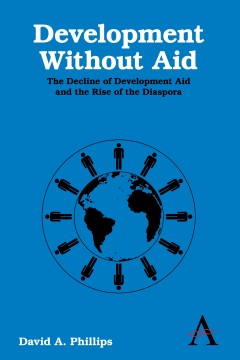Development Without Aid
The Decline of Development Aid and the Rise of the Diaspora
By David A. Phillips
- About This Book
- Reviews
- Author Information
- Series
- Table of Contents
- Links
- Podcasts
About This Book
“Development Without Aid” opens up perspectives and analyzes facts about foreign aid to the poorest developing countries. The discussion is advocacy as much as analysis, and makes extensive reference to recent research, including the author’s previous work on the World Bank.
Starting from a perception about development formed during the author’s formative years in what is now Malawi, the book develops a critique of foreign aid as an alien resource inherently unable to provide the necessary dynamism to propel the poorest countries out of poverty, and compromised by profound anomalies which subvert its own effectiveness. The book aims to help move the perception of development in poor countries squarely beyond foreign aid and beyond the discussion of its role, architecture and design, and to re-assert an indigenous development path out of poverty.
To move beyond foreign aid, the book examines a new international dynamic, i.e., the rapid growth of the world’s diasporas as a quasi-indigenous resource of increasing strength in terms of both financial and human capital. It considers the extent to which such resources might be able to replace the apparatus of foreign aid and help move towards a reassertion of sovereignty by poor states, especially in Africa, over their own development process.
Reviews
‘This is a very well-written book which will no doubt have a wide readership covering practitioners of both public and development policy […] In the context of the unresolved controversies relating to the developmental role of external aid, the author makes important contributions towards bringing out the importance of country-specific insights in understanding the mechanisms and processes that explain why, how and when aid works in particular societies which are key considerations for making the design and delivery of aid effective. ’ —Mustafa K. Mujeri, ‘Bangladesh Development Studies’
‘An excellent book – one that I hope starstruck journos at the “FT” and “Economist” [...], who have given the [World] Bank a free pass over the years, will read.’ —Andrew Hilton, ‘Financial World’
“David Phillips has written a sustained and reasoned condemnation of the aid process as practiced for the last half century. Anyone defending the aid industry will need to confront this important book.” —Kenneth Reinert, Professor of Public Policy, George Mason University
“David Phillips makes a compelling case that international migration and remittances have vast potential to promote development in many of the world’s poor nations. By contrast, foreign aid – in its current form – is unlikely to lead to transformative changes in the developing world. His ideas are prescient. Development professionals should take note.” —Dean Yang, Associate Professor, Department of Economics and the Gerald R. Ford School of Public Policy, University of Michigan
“In ‘Development Without Aid,’ David Phillips has written a timely book that challenges many accepted ideas about foreign aid. This compelling text will provoke an interesting and necessary debate.” —Moisés Naim, Carnegie Endowment, and author of “The End of Power”
“The merit of this volume is in bringing together detailed information on aid and its impact with a full insider’s understanding of the bureaucracy of aid and how it can distort weak economies.” —John Weiss, Professor of Development Studies, University of Bradford
Author Information
David A. Phillips is a writer and economic consultant. He was educated in Britain and has a PhD in economic development.
Series
Table of Contents
List of Acronyms; Acknowledgments; 1. Introduction: Motivation and Perspective; 2. What Is Foreign Aid, Who Does It, Why and How Much Is There?; 3. How Far Has Development Aid Been Effective?; 4. Why Has Development Aid Done So Little?; 5. Changing the Dynamics of Development; 6. “New Aid”: New Ways to Promote and Finance Development?; 7. Another Pathway Out of Poverty?; 8. Exit Strategy – Replacing Foreign Assistance; 9. Postscript; Notes; Index
Links
Stay Updated
Information
Latest Tweets



